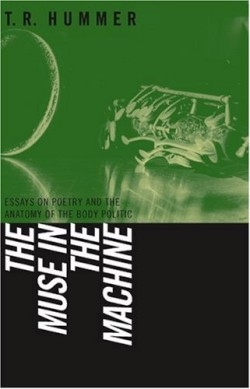
The Muse in the Machine
Essays on Poetry and the Anatomy of the Body Politic
Having vaporized a class bully, Calvin says to Hobbes, “my ethicator machine must have had a built-in moral compromise spectral release phantasmatron!” About a world no less fantastic than Calvin’s, a world in which power-elites manipulate language in Orwellian ways to perpetrate an un-ethical status quo, the author writes that “advocates of different pictures of the universe must learn to argue with passion but without violence.” Having faced a collapse of faith in the face of American realpolitik, Hummer, in this book of essays, articulately examines the role of the poet, the imaginator, during a time when bullies predominate and “a repressive or censorious atmosphere in government affects everyone in the culture.”
Ranging from literary examinations of the works of Vachel Lindsay and Robert Penn Warren to analyses of the effects of censorship on the NEA and how his youth in Mississippi during the 1960s formed his poetic and political personality, Hummer ultimately addresses the central concern all artists have during times when art itself is devalued: why make art at all? Hummer repeatedly returns throughout the essays to his upbringing in the Deep South and the role that culture plays in forming world view and imagination, particularly the crisis one faces in understanding “the self-image I was given from birth […] was a lie.” The psychological imperative to make meaning of meaning, when the times and culture devalue all one values, is what knits together these eight diverse essays, which have been published in various journals over the past two decades. Hummer asks himself and the reader “What is a writer for?”
The author of nine books of poetry, among them the acclaimed Whitman in Hell, formerly the editor of The New England Review and currently editor of The Georgia Review, Hummer knows whereof he speaks. Therefore, his articulate explication in “‘Sen-Sen,’ Censorship, Obscenity, Secrecy” of how “the imagination itself, as opposed to its mere products, which are obviously vulnerable—can be censored” carries weight today when the powers of the state and corporate media define more than ever “legitimate” imagination. Hummer’s essay “The Revenge of the American Leviathan,” first published in 1992 during the First Gulf War, is perhaps more compelling and relevant today, as the world turns round a widening gyre. Hummer’s analysis of Hobbes’s utopian vision in relation to current world conditions reminds the reader: “Conscience is the binding force of the body politic; language is the locus, the substance, the connective tissue of conscience.”
Marked with urgency, Hummer’s essays demand a cultural reevaluation of attitudes toward language, imagination, and citizenship. In the face of war and cultural hegemony, Hummer writes, “Maybe the virtue and value of writing poetry, fiction, nonfiction, and of all the other arts as well, is that they channel the energies of certain clever people into ends other than destruction and death.”
Reviewed by
Duncan Sprattmoran
Disclosure: This article is not an endorsement, but a review. The publisher of this book provided free copies of the book to have their book reviewed by a professional reviewer. No fee was paid by the publisher for this review. Foreword Reviews only recommends books that we love. Foreword Magazine, Inc. is disclosing this in accordance with the Federal Trade Commission’s 16 CFR, Part 255.
